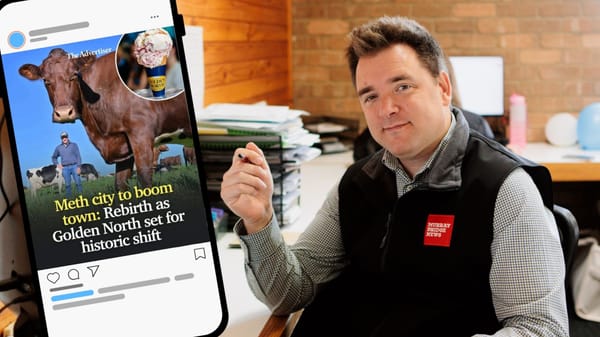Could share housing solve Murray Bridge’s rental crisis?
Peta Smart wants to start an ethical landlords' co-operative that could make the city's housing stock more suited to local people's needs.

This post about a community cause is free to read. Please help Murray Bridge News tell more local stories by subscribing.

Now that her kids have left home, a three-bedroom home is not what Chris Smart needs.
She has held a variety of part-time and contract positions in the late stages of her working life, and would struggle to pay rent on her own.
She is not the only one.
About a third of Murray Bridge households – 2345 of them – consist of just one person, according to the Australian Bureau of Statistics.
But more than 80 per cent of local houses have three or more bedrooms.
There’s a mismatch between the city’s housing stock and its people’s needs.
Enter Peta Smart, who hopes to try out a new housing model – one she hopes will catch on in a big way.
She bought a four-bedroom house in Murray Bridge last April and has been remodelling it into a share house for single women.
Each resident will have her own bedroom and bathroom area, plus access to a shared kitchen and living spaces, with wi-fi and utilities included in the boarding fee she pays.
Each will have a periodic lease, with the ability to move out if she finds longer-term accommodation.

It sounds like the sort of thing a not-for-profit organisation would usually do, but Ms Smart said she was simply a private landlord who recognised the problem at hand.
She treated the project like a social enterprise: a way of making a profit while also meeting a community need.
“Homeless people don’t look like what you think they look like now,” she said.
“Homeless people aren’t junkies with needles hanging out of their arms, yelling out lewd things about Jesus as you walk down the street.
“Homeless people are single mums who worked part-time, raised their children, their children are 40 and they’re left behind.”
First they crashed at a friend’s place or on their daughters’ couches, she said; then they wound up sleeping in their cars because they did not want to be a burden.
The share house – she called it Chrissy’s Place – would be a refuge for women like that.
Chris, her mum, will be one of its residents.
The journey hasn’t been easy – renovations which were originally supposed to take three months and cost $30,000 have stretched out over 18 months and cost a lot more.
But a number of local businesses have donated or discounted supplies and services to help Peta reach her goal.
“Everyone keeps telling me I’m crazy ‘cause, ‘you know, homeless people will trash the place’,” she said.
“But what I want to demonstrate here is that homeless people will not trash the place.”

One landlord can’t make a big impact, but many could
For years, Val Braendler has been passionate about helping people on the margins find homes in the Murraylands.
With so many people desperate to find rental housing, she said, it was understandable that many landlords were jacking up their prices and being picky about who went into their properties.
Others turned a blind eye to the conditions in which their tenants lived, or the level of compassion shown by their property managers, so long as the rental income kept flowing.
She urged them to change their thinking.
“Having a stable home environment is so very important for children who have often had to cope with change from school to school, cope with separating parents and often the domestic violence involved, and cope with deprivation of basic needs due to one parent’s minimal income when having to pay higher rentals and changing employment circumstances,” she said.
Perhaps a landlords’ co-operative could pool resources to maintain or upgrade houses like Ms Smart’s, or farm outbuildings, and lease them to survivors of domestic violence, for example.
A shared “slush fund”, used to repair damage to any of their properties, would reduce the financial risk to any individual landlord.

Perhaps landlords could sign up to an ethical charter of some kind, where they promised not to take advantage of vulnerable tenants by racking and stacking them eight 12 to a house.
What if there were a not-for-profit property management agency in town?
Ms Smart, for one, hoped her housing project would show other local landlords that they could make a real difference in the community.
She, too hoped they could coordinate their efforts to make up a co-operative of ethical landlords.
She would be willing to rent places at market value and sub-let them herself if that was what needed to be done, she said.
But she encouraged interested landlords, or people with the inclination and means to help, to get in touch about working together.
- Contact Peta Smart: 0439 641 838.
- Contact Val Braendler: 0487 041 046.
- Get help: Contact the Homelessness Gateway on 1800 003 308; or visit AC Care at 29 Bridge Street, Murray Bridge or www.accare.org.au.
You can help keep local stories like this one free for everyone to read. Subscribe to Murray Bridge News today and support your independent, locally owned news service, plus get access to exclusive stories you won’t find anywhere else, from just $5 a month.





